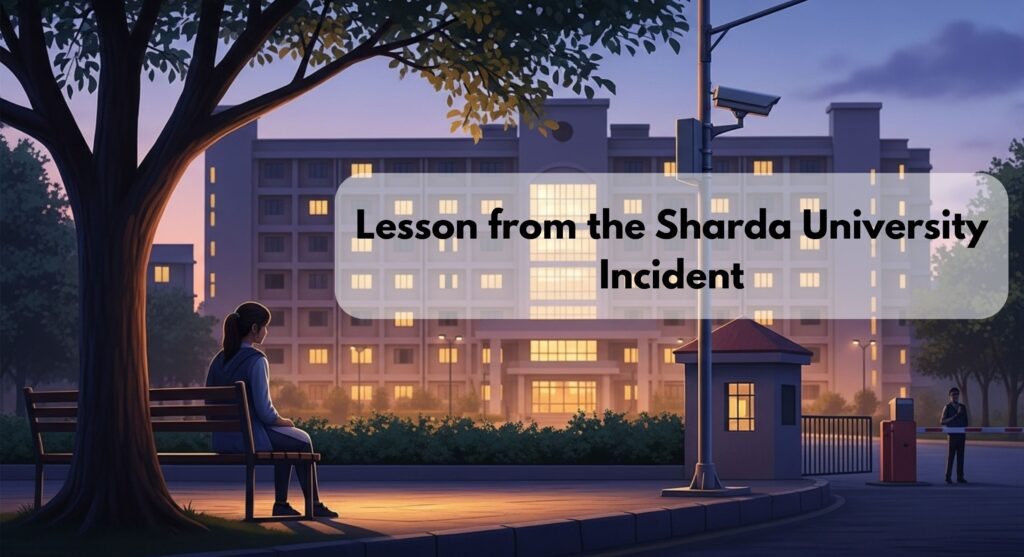
Wake-Up Call for Institutions: Lesson from the Sharda University Incident
Section 1 – What Happened – And Why It Matters to Security
On July 18, 2025, a shocking tragedy unfolded at one of India’s most prominent private universities. A 21-year-old dental student at Sharda University was found dead by suicide in her hostel room. This heartbreaking loss has since become known as the Sharda University Incident, and it has sparked an urgent national conversation on the hidden emotional crises faced by students in residential academic institutions.
The suicide note left behind cited persistent mental harassment and directly named faculty members. Her parents later confirmed that she had attempted to raise concerns multiple times, but her complaints were allegedly dismissed or ignored.
Despite a campus equipped with security personnel, CCTV surveillance, and administrative protocols, the young woman’s emotional distress went unnoticed, unaddressed—and ultimately, became irreversible.
This Incident is not just a story of personal loss. It is a stark reminder of a systemic failure—where visible security infrastructure failed to detect invisible emotional suffering. It exposed a critical blind spot in how we define safety in education.
Section 2 – Security or Support? Rethinking Campus Safety After the Sharda University Incident
Traditionally, campus security systems have centered around physical safety. These measures include:
- Entry/exit control
- Theft prevention
- CCTV monitoring
- Emergency drills
While important, these tactics are no longer sufficient. Modern students, especially those in residential campuses, face a new wave of threats:
- Academic stress and high expectations
- Emotional isolation in hostels
- Reluctance to report harassment
- Power dynamics between faculty and students
- Ineffective or inaccessible complaint systems
These emotional and psychological stressors cannot be caught on a security camera. And in the case of the Sharda University Incident, the absence of emotional support systems proved fatal.
What’s needed now is a shift from reactive surveillance to proactive emotional vigilance—a model where physical security and psychological safety are treated with equal urgency.
Section 3 – A Smarter, Safer Model for Campus Security
At BPS NextGen Solutions, we believe true campus safety means going beyond locked gates and camera feeds. Guards should not just be watchers—they must be trained observers, capable of identifying signs of emotional decline and acting before tragedy occurs.
The Incident makes it painfully clear: visible safety measures cannot prevent invisible suffering unless we evolve our approach.
Security Layer | What Failed at Sharda | What Should Be in Place |
Welfare Monitoring | No emotional distress signs were reported or tracked | Security logs that track isolation, anxiety, and sudden behavioral changes |
Complaint Oversight | Student complaints were ignored or mishandled | Anonymous and neutral grievance channels jointly run by student affairs and security teams |
Emergency Response | No immediate help mechanism existed in the hostel | In-room panic buttons or student safety apps linked to the security network |
Behavioral Awareness | Staff were untrained to detect or respond to signs of psychological decline | Emotional intelligence and crisis-response training for all on-ground personnel |
Our Core Framework: Human-First Campus Protection
Our vision is to build emotionally responsive, behaviorally aware security systems that go far beyond traditional protection. This includes:
- Behavioral Observation Training
Security teams are trained to detect early signs of distress—withdrawal, agitation, or unusual isolation. - Soft Zone Surveillance
Security presence is increased in low-visibility hostel zones like stairwells, quiet corridors, and study lounges, where emotional episodes often go unseen. - Integrated Grievance Alerts
Security personnel contribute observations to institutional logs that support early mental health interventions or formal investigations. - Welfare Coordination
Guards, wardens, and counselors regularly share insights and red flags—like students skipping meals, locking themselves in rooms, or showing signs of distress during phone calls.
A Message to Parents: Real Safety Means Being Noticed
If you’re a parent sending your child to a residential college, you’ve probably asked if the campus has CCTV and 24/7 guards. But after the Incident, perhaps a better question is:
“Will someone notice if my child is suffering in silence?”
At BPS NextGen, our systems are designed so that someone always notices—not just sees. We’re not just monitoring campus perimeters—we’re protecting student lives from within.
The Future of Campus Safety: Proactive. Preventive. Human.
The Incident underscores a painful but necessary truth: passive security is no longer enough. Institutions must now redefine their security models to prioritize:
- Emotional intelligence training for guards
- Trauma-informed response protocols
- Integrated communication across welfare, security, and counseling teams
- Anonymous reporting tools that protect victims
- Regular student wellness audits—not just paperwork compliance
Universities that don’t evolve risk more than just isolated tragedies—they risk their reputation, their trust, and their moral credibility.
Let’s Build Safer Campuses—Together
At BPS NextGen Solutions, we help institutions across Delhi NCR and beyond transition into emotionally responsive, psychologically safe learning environments.
If you’re a school administrator, college dean, or concerned parent—the Sharda University Incident is a reminder that change can’t wait.
Security isn’t just about watching. It’s about noticing—and responding, before it’s too late.
Contact us now: +91 8882264243
Or explore our full range of safety and surveillance services at: https://bpsnextgen.in/services/
Together, we can create campuses where every student feels seen, safe, and supported.
Recent Blogs
- Best Facility Management Services in Delhi
- Best Security Guard for Night Duty
- Valuable Lesson from the Sharda University Incident
- Best Security Services for Shopping Malls
- Best Security Guard Company in delhi
- Best Security Services for Schools in Delhi
- Security Services for Logistics
- Top Security Guard Company in Delhi NCR: BPS NextGen Solutions Pvt. Ltd.
- Best Security Agency in Delhi – BPS NextGen Solutions Pvt. Ltd.
